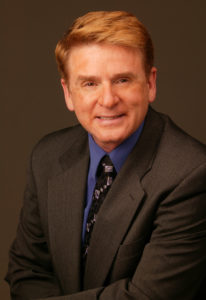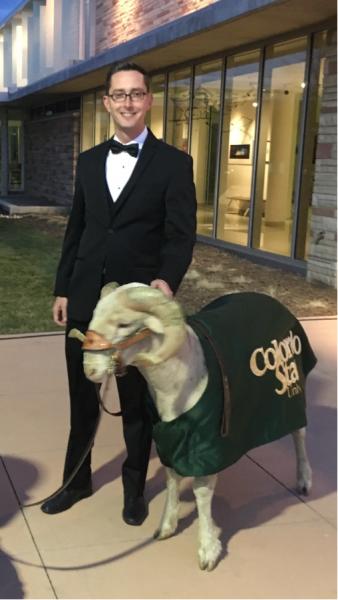Dr. Erik Johnson, Colorado State University music education professor and the director and creator of the Middle School Outreach Ensembles, found a common goal with CSU alum and donor Jim Vidakovich: Service.
Both men use art and music to uplift and educate.

Vidakovich's Impact on CSU
Following a prominent career in television as a broadcast journalist and media strategist, including an Emmy for his team's work on the ethnic and gender barrier-breaking Sesame Street, Vidakovich found 'new relevancy' in his retirement. He is profoundly impacting CSU programs, students, and the surrounding community.
A CSU graduate (B.A., '69, M.A., '76, speech arts), Vidakovich's list of causes at the university is impressive. He's used his corporate strategy and training expertise to assist with developing the ACT Human Rights Film Festival at CSU.
In 2016, Vidakovich attended a Middle School Outreach Ensembles (MSOE) concert where he witnessed and admired the results of weeks of practice and social justice work. After getting to know Johnson over the next several years, he became the collaborative creator and the lead donor of the Youth Programs in Arts and Education fund. The endowment supports programs such as MSOE, Trying on Teaching (ToT), and BRAINY (BRinging Arts INtegration to Youth), which enrich the lives of hundreds of Northern Colorado students from elementary to high school. The fund embodies the university's land-grant mission by providing equal opportunity and access to performing and visual arts programming.
The endowment is pivotal. It is a momentous era for music education students and faculty and a generous gift that will brighten the future of the CSU Music Department while reaching underserved youth.

Early Concept
MSOE is an affordable ($25) ten-week program open to 7th and 8th-grade musicians across the Front Range, regardless of musicianship level. The highlight feature of the program is the role middle school, high school, and college students each play in educating one another. Johnson's entrepreneurial model has a highly developed business plan but MSOE's equity and service role has roots in his simple upbringing and formidable experiences in bringing people together to support a cause.
The MSOE concept came early to Johnson, as far back as his high school days at Rangeview High School in Aurora, Colorado. As a student without a pathway to college, he joined the Junior Air Force ROTC to improve his chances and was corps commander of one of the country's top JROTCs. His group won Honor Corps, and along with it, Johnson received an appointment to the U.S. Air Force Academy and the opportunity to attend the annual National Youth Leadership Forum on Defense Intelligence and Diplomacy in Washington, D.C. Johnson thought he would become a foreign policy specialist and aspired to work for the U.S. State Department.
Upon returning from D.C., his youth pastor challenged him by asking, "What are you going to do with your life that will help people?"
"And so, I went home and saw a public service announcement on the TV," Johnson said. "I saw that star shoot across the screen, and it said, 'Teach. The more you know,' and I decided to shift my entire trajectory at that moment, and my first thought was, 'What am I going to teach?'" The high school sophomore went to school on Monday, determined to become a teacher. "I went to my band director, Dan Bell, and said, 'Mr. Bell, I want to be a music teacher. I've just decided, and I need to get some practice.'"
Mr. Bell taught Johnson some conducting techniques and gave suggestions for working with their band, but Johnson yearned for something more. At that time, many local elementary students were without band and orchestra programs following district layoffs, so Johnson and his classmates decided to focus on these schools. The teens met with their principal and were given permission to start an after-school music program, and received a week off to prepare for it.
In preparation, the group approached local music stores and obtained stands and books. Johnson expanded his conducting skills by taking lessons with retired band director Larry Wallace, one of Colorado's most accomplished band directors. They went to the elementary schools with flyers and a presentation demonstrating different instruments. Johnson and his friends recruited almost 300 elementary kids who rehearsed two nights a week in sectionals and large groups entirely run by high school students; the outreach program is in service at Rangeview High School to this day.
A revered program
While at CU Boulder, Johnson founded a program similar to the one he created in high school; the Middle School Wind Ensembles became his doctorate research project exploring teacher identity development. The program was well received, and because Johnson had experience teaching this model, he felt comfortable creating it again at Colorado State University.
The rest is history. Even after being confronted by COVID in 2021 and implementing a better work-life balance in 2022, Johnson refused to take the program off his plate because of the value it adds to the educational experience for hundreds of CSU and community students. MSOE is a revered teaching model at the university and a method other programs hope to emulate.
"So much of college is theoretical, but life is functional," said Vidakovich, paraphrasing Benjamin Franklin. "Tell me, and I'll forget…involve me, and I'll remember. [MSOE] is experiential, hands-on learning, and I'm all for that."
Transformational learning
Teaching, conducting, and connecting with students is provided by practicums and student teaching established in the music education curriculum. However, extra time in a classroom setting like the MSOE program is unique, and when students receive feedback from colleagues, master teachers, and faculty, the benefits are compounded.
"I think transformation only occurs when you color outside the lines," said Vidakovich. "And that's what CSU students are doing – they are coloring outside the lines." Vidakovich believes the pandemic put a spotlight on the importance of social skills and engagement. "Transformation equals growth, growth equals progress, and progress equals a more educated and advanced society," he said.
With both men leading with heart and years of experience, the arts community in Northern Colorado will only flourish in the coming years.
